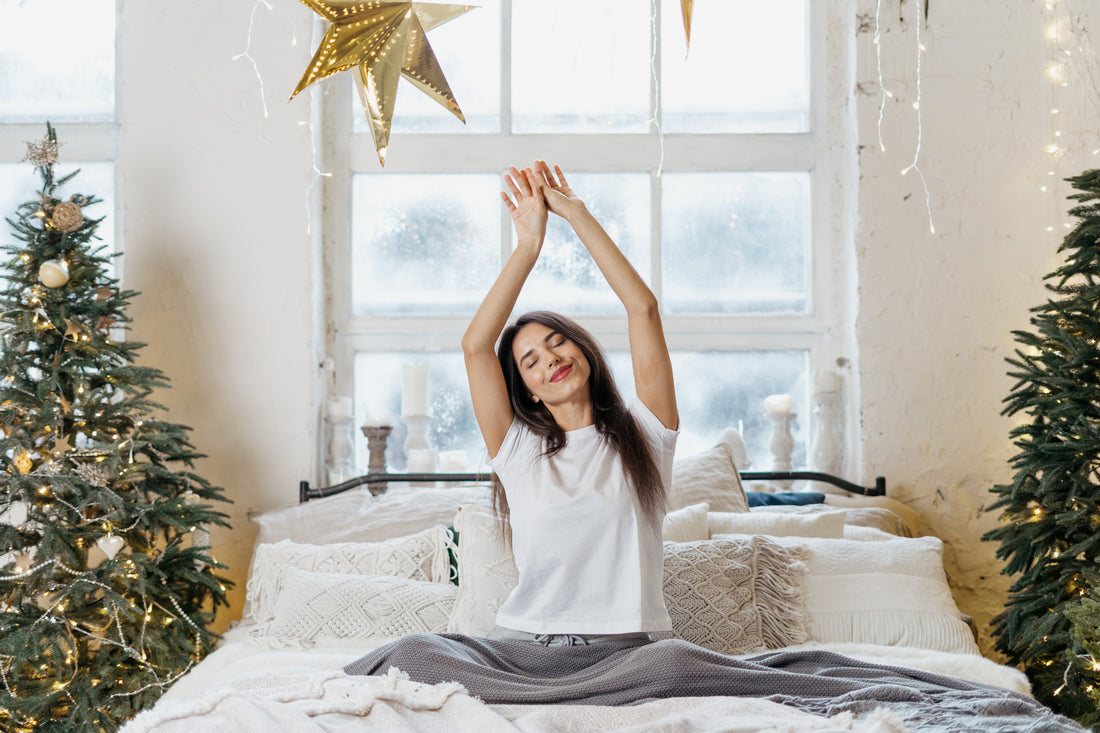14 Simple Tricks You Can Adopt to Wake up Early in Winter

Key Points
- Getting up early in the morning during winter is often a challenging practice for many people due to the cold and dark weather creating a sleep-inducing environment.
- Nevertheless, there are a number of tactics people can adopt to circumvent the struggles faced whilst waking up and feeling energetic in the morning.
- As long as you remain committed to maintaining the discipline of getting up early, the habit of waking up at the crack of dawn will become second nature.
Getting up on a frosty winter morning may be problematic for many. It is freezing cold and dark outside – the direct opposite of your warm and comfortable bed. With that, shutting your eyelids for an additional fifteen minutes at the crack of dawn may be enticing, though it would usually lead to oversleeping.
Nonetheless, it is entirely possible for anyone to learn how to become a morning person during the winter season. In essence, it simply takes a tiny amount of grunt work coupled with loads of patience and dedication.
Why Is It So Challenging to Get Up Early in the Winter?
There are many reasons why most people struggle to get up during the early mornings of the winter season. Much of this can be attributed to how the season affects a person’s sleep cycle.
To begin with, the body’s sleep-wake cycle is regulated by a natural hormone known as melatonin, whereby its production levels are elevated whenever we are surrounded by darkness. As the mornings during the winter season are often pitch-black when we wake up, our melatonin levels are, therefore, at their highest, resulting in increased difficulty as we attempt to get out and be active [1, 2].
Besides that, the absence of sunlight also affects an individual’s Vitamin D and serotonin production levels. To dive a little into the biological side of things, Vitamin D is known as the sunshine vitamin because our body generates it whenever our skin is exposed to direct sunlight [3, 4]. This vitamin, in turn, bears the responsibility of regulating phosphate and calcium metabolism activities, processes that play a role in sustaining our skeletal health and metabolic functions [3, 4].
On the other hand, serotonin is a type of neurotransmitter hormone generated by our brain and intestines. Fundamentally, serotonin plays a part in regulating our emotions, appetite, mood and digestion process. Thus, a deficiency in serotonin may elevate our risk of developing anxiety and depressive disorders. As a result, such health conditions would make it much more challenging for us to leave our warm and cosy beds in the early winter mornings [5].
In addition, our circadian rhythm regulates our body temperature - another factor impacting our sleep-wake cycle [6, 7]. It has been indicated that our core body temperature will rise approximately two hours before we wake up to aid the waking process, and it will continue to elevate through the day before reaching its peak in the early evening [6, 7]. However, the winter season may often cause our rooms to be cold during the mornings. Thus, we tend to feel sleepy and want to stay in bed longer.
Other than that, having an unhealthy lifestyle as well as dietary habits, such as consuming too many sweets, avoiding fresh fruits and vegetables, and skipping exercise, may also cause your energy levels to take a nosedive [8, 9, 10]. Consequently, these will all lead to you facing a lot of struggles when attempting to get up during the early mornings of winter.
Why Is Getting Up Early Considered a Good Practice
It may be a cliché to say that the early bird gets the worm, but it certainly rings with a lot of truth. All in all, our days can sometimes get packed very quickly, so getting up early would equate to having more time for self-care and productivity. Through this practice, early risers would often be significantly more organised and prepared for the long day ahead. Not to mention, getting up earlier in the morning keeps your body active, thereby increasing your ability to fall asleep seamlessly when bedtime arrives. As a result, you may enjoy a lower level of stress and, thus, an improved mood in general.
Practical Tips for Helping You Wake Up During Winter Mornings
With all this in mind, we come to the question – what types of strategies can we employ to become a morning person during winter when it's practically pitch black outside?
Fortunately, there are many tips you could consider as you go through the frosty season, including the following:
Take a B・SYNC ON Tablet Before Sleeping
As the world’s first-ever clinically proven wake-up tablet, B・SYNC ON is packed with natural ingredients like caffeine, vitamin B5, vitamin B12 and zinc to support and enhance your wake-up process. Upon consuming a B・SYNC ON tablet before going to sleep, its delayed-release capsule waits until you have enjoyed a full night’s rest before it begins to release these energising ingredients – approximately seven hours later. As a result, you can wake up slowly and seamlessly, thereby enabling you to be in a joyful mood throughout the day no matter how cold or dark it is outside. Try B・SYNC ON today!
Increase Your Vitamin D Intake
Given that one of our main sources of Vitamin D is sunlight, most people tend to fall short of their Vitamin D levels during the colder months. To make matters worse, several research findings have showcased the proportional relationship between Vitamin D levels and sleep quality. Hence, it would be advisable for one to consume more foods that are packed with Vitamin D, such as eggs and salmon, or consider taking a Vitamin D supplement to counteract the struggles of getting up in darkness.
Get Everything Ready for the Next Day Before Sleeping
Having to select your attire, clean your dishes from dinner the night before or sort out your laundry is most probably the last thing anyone wants to do on early winter mornings. What’s more, knowing the huge amount of work we have ahead of us may predispose us to feel tired and unwilling to get out of bed. Thus, it would always be worthwhile to prepare everything you need for the following day just before you call it a day and head to bed. Committing around ten to fifteen minutes to sorting out your to-do’s for the next day would make your life substantially more convenient later on.
Adhere to a Specific Bedtime Routine
Regardless of what time of the year it is, the general advice to ensure you can wake up feeling fully energised is to stick to a routine sleep schedule and wake-up time. By doing so, your body gets into a natural circadian rhythm so that waking up in the winter isn’t too challenging (despite the various temptations for you to fall back asleep).
Make Sure You Have the Perfect Sleep Environment
Setting up the optimal sleep environment is another strategy you could adopt to maximise the quality of your sleep and enable you to wake up early with ease. Luckily, there are multiple approaches to do so, and they can range from wearing eye masks or earplugs to introducing aromatherapy. All in all, the whole idea is to discover which method suits you best to sleep soundly throughout the night and feel well-rested as the morning arrives.
Ensure the Environment Is Warm upon Waking Up
Essentially, most people prefer to be in a warm environment as opposed to being out in the cold. Therefore, have a warm coat or jacket and woollen slippers ready by your bed prior to going to sleep. That way, you have something warm to wear the moment you get up in the morning, allowing you to resist the impulse to get back into bed.
Alternatively, you could consider adjusting your central heater to switch on at least half an hour before your waking time. In certain cases, some central heating can be controlled using a mobile application. Thus, you could avoid waking up cold whenever it is about time for you to get up and go.

Introduce as Much Natural Light into Your Room as Possible
One convenient tactic one can use to help wake up naturally is by letting natural sunlight enter their bedroom. The problem is when the winter season arrives, meaning that there is very little sunlight. Thus, it would be a good idea to consider purchasing a sun lamp (also known as a SAD lamp) to gently prepare your body for getting up. These lamps help promote a healthy sleep-wake cycle.
Ensure Your Bedroom Has a Consistent Flow of Fresh Air
Fresh air can stimulate your body to feel energised and ready to start the day. However, it’s not always the wisest idea to leave the window open during winter. Therefore, purchasing an air purifier that operates in silence can be a viable alternative to ensure you can still access clean air whilst you sleep. Not to mention, air purifiers usually have a 360° airflow intake to distribute the clean air to all corners of a room.
Avoid Hitting the Snooze Button
It is almost never worth it to get that extra five minutes of sleep because it could make you feel much more sluggish the moment you finally decide to get up. Thus, one simple yet effective strategy to avoid hitting snooze is to place your alarm clock as far away from your bed as you can, forcing you to get up to switch it off.
Give Yourself Something to Look Forward to in the Morning
It is often easier to get up and feel awake if you concentrate on an upcoming event that excites you as opposed to a dreaded chore. Try to plan something you look forward to doing every morning to help you wake up with greater ease. It could be having a warm mug of hot chocolate, having your favourite breakfast, taking a refreshing shower with a special soap or watching a newly released Netflix series. Whatever it might be, aim to treat yourself with something that will motivate you to get out of bed.
Get Active
Although not everyone would have the time and energy to get through a full exercise regime each morning, doing a bit of stretching under the covers or spending a couple of minutes jogging in place can help to get your body in gear.
Kickstart Your Day with Upbeat Music
Nothing beats the sound of good music. If you are a lover of excellent beats, try to compile a playlist consisting of your favourite tunes so that you can hit the play button right away in the morning and please your eardrums with the sound of your go-to song.

Take a Shower as Soon as You Get Out of Bed
A warm shower right after getting up can help to get your circulation going. Do also consider using a shower gel with an invigorating scent to aid you in feeling more alert. Popular go-to options include mint, lemon or peppermint flavours.
Hydrate and Caffeinate Yourself
Place a full glass of water on your bedside table that you can drink before getting out of bed. Doing this may help to wake you up.
Similarly, programming your coffee machine to get your hot drink ready in the morning can be a lifesaver, too, as the aromatic scent of the coffee, coupled with the sweet sound of grinding, may be extremely satisfying. If it is too difficult for you to get yourself out of bed to have a cup, it is absolutely fine to keep a small pot beside your bed.

Concluding Thoughts
All in all, waking up early can be challenging – especially during the freezing winter season, where the shorter days and longer nights might disrupt your body’s sleep-wake rhythm. These, in turn, are definite contributing factors that can easily tempt you to get back under your bed sheets and sleep in longer.
Nevertheless, you can overcome those demons! There are many strategies you can employ to resist the temptations of lying in, perhaps the best of which is to take a B・SYNC ON tablet at bedtime. Develop the habit of waking up early, and over time, getting up on cold winter mornings will be a breeze.
Frequently Asked Questions (FAQs)
Why do we sleep so much during winter?
Due to winter having less sunlight, your body produces more melatonin, a hormone within your body that plays a part in promoting natural sleep [1, 2]. Furthermore, cold temperatures cause your body to upregulate its melatonin production levels, resulting in an increased tendency to feel tired [1, 2].
How can you wake yourself up during winter?
There are various strategies one can employ to improve their ability to get up on winter mornings. To begin with, exposure to natural light helps trigger your brain to halt the synthesis of melatonin, a type of sleep hormone [1, 2]. Consuming caffeinated drinks at an appropriate time may aid you in feeling more awake, alert and energetic to take on the new day. Besides that, doing some light physical activities, such as going for a quick walk or doing a few jumping jacks, can help wake you up. Other strategies, such as planning something for you to look forward to, taking a warm shower the moment you get out of bed, and ensuring that your alarm clock is placed on the other side of your room, are also simple yet effective strategies for waking up early during winter.
Is it healthy to wake up early?
There are various irrefutable benefits associated with getting up early. For instance, many have reported an increased productivity level due to the lack of distractions. As a result, their increased performance enables them to stand a relatively higher chance of attaining success compared to late risers [11, 12]. All in all, waking up early may also offer the individual a greater sense of order in life, thereby aiding them in feeling happier and well-rested.
References
https://www.ncbi.nlm.nih.gov/pmc/articles/PMC6017911/
https://www.ncbi.nlm.nih.gov/pmc/articles/PMC3047226/
https://www.nhs.uk/conditions/vitamins-and-minerals/vitamin-d/
https://www.ncbi.nlm.nih.gov/pmc/articles/PMC3897598/
https://www.pbsnc.org/blogs/science/sunlight-happiness-link/
https://www.sciencedirect.com/science/article/pii/S2468867319301804
https://www.ncbi.nlm.nih.gov/pmc/articles/PMC3427038/
https://www.ncbi.nlm.nih.gov/pmc/articles/PMC8848117/
https://www.ncbi.nlm.nih.gov/pmc/articles/PMC5922510/
https://www.ncbi.nlm.nih.gov/pmc/articles/PMC5385214/
https://www.bbc.com/worklife/article/20190213-is-waking-up-early-good-or-bad
https://hbr.org/2010/07/defend-your-research-the-early-bird-really-does-get-the-worm







